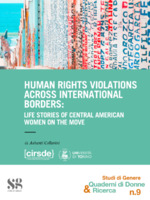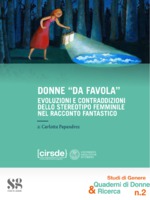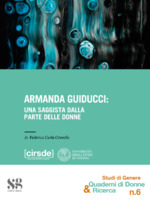Sfoglia documenti (13 in totale)
- Collezione: Studi di Genere. Quaderni di Donne & Ricerca
Sort by:
Human rights violations across international borders: life stories of Central American women on the move
The essay documents and analyses the topic of violence in Central American migration, with a specific focus on migrant women in the current mobility regime South-North. We start by tracing the conditions that push women to undertake the migratory path in their countries of origin, more specifically in the Northern Triangle countries, that include Honduras, El Salvador and Guatemala; we then analyze the moment of transit, in order to highlight some of the great challenges that women incur in their path towards the destination country, being it Mexico or the United States; lastly, we shed light on the border-crossing experience and on some life stories in the context of arrival. Through this work we aim at demonstrating that the journey of Central American women is shaped by different forms of violence in every step of migration, and how the mobility and border regime is strongly compromised by the lack of application of a human rights approach. The personal contribution to this work is given by a fieldwork realized through eight qualitative interviews with experts in the field.
Donne "da favola". Evoluzioni e contraddizioni dello stereotipo femminile nel racconto fantastico
How has the image of the woman changed over time? Can we say that certain "old" stereotypes have lapsed?
In this analysis I’ve reflected about the theme, comparing some modern cinematographic revisitations and the corresponding written texts in the field of the fantastic genre, to understand if and how the female image (and not only) has changed from a century to another (in this case between the 19th and the 21st century).
The research has developed through the semiotic and gender studies, in order to analyze the diversities and the characteristics of the various texts observed (written and audiovisual) and to realize how the idea of feminine is changed and, maybe, evolved, proposing new type of characters (and also a new and complex dialogue with the masculine counterpart).
It emerges, indeed, the necessity to reflect on these stereotypes, on the modalities of development over time and on the difficulty that still today, despite certain changes, remains in thinking them (and thinking differently).
Because, in the end, what does it mean male and female? What makes us who we are?
Armanda Guiducci: una saggista dalla parte delle donne
The work outlines the profile of Armanda Guiducci (Naples 1923 - Milan1992): philosopher, anthropologist, writer and literary critic. Through various archive researches the author's literary biography has been reconstructed, which returns the image of an eclectic writer, with composite intellectual activity and a wide and varied production. At the same time the work studies seven essays by Guiducci on the condition of women which, although they share a purely anthropological approach, belong to different genres. Therefore, underlining analogies and differences, the thesis highlights how each of them declines certain themes, as the point of view assumed by the author and the use of some common stylistic traits; with the aim of providing an even more detailed profile.



